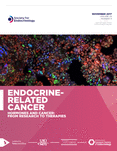Prostate cancer genomics by high-throughput technologies: genome-wide association study and sequencing analysis
- Laboratory for Genome Sequencing Analysis, RIKEN Center for Integrative Medical Sciences, Yokohama, Japan
- Correspondence should be addressed to H Nakagawa; Email: hidewaki{at}ims.u-tokyo.ac.jp
Abstract
Prostate cancer (PC) is the most common malignancy in males. It is evident that genetic factors at both germline and somatic levels play critical roles in prostate carcinogenesis. Recently, genome-wide association studies (GWAS) by high-throughput genotyping technology have identified more than 70 germline variants of various genes or chromosome loci that are significantly associated with PC susceptibility. They include multiple 8q24 loci, prostate-specific genes, and metabolism-related genes. Somatic alterations in PC genomes have been explored by high-throughput sequencing technologies such as whole-genome sequencing and RNA sequencing, which have identified a variety of androgen-responsive events and fusion transcripts represented by E26 transformation-specific (ETS) gene fusions. Recent innovations in high-throughput genomic technologies have enabled us to analyze PC genomics more comprehensively, more precisely, and on a larger scale in multiple ethnic groups to increase our understanding of PC genomics and biology in germline and somatic studies, which can ultimately lead to personalized medicine for PC diagnosis, prevention, and therapy. However, these data indicate that the PC genome is more complex and heterogeneous than we expected from GWAS and sequencing analyses.
- Revision received 22 April 2013
- Accepted 23 April 2013
- Made available online as an Accepted Preprint 26 April 2013
- © 2013 Society for Endocrinology












